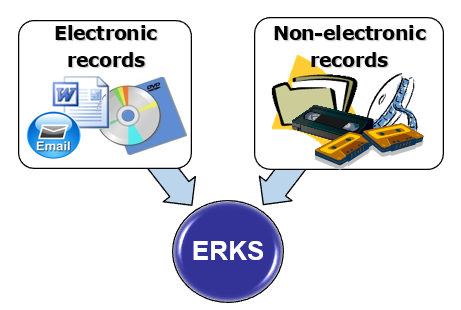Preservation
ERKS / Continuity
Electronic Recordkeeping System (ERKS) is an information / computer system with the necessary records management capabilities designed to electronically collect, organise, classify and control the creation, storage, retrieval, distribution, maintenance and use, disposal and preservation of records.
You may probably have heard that the Government is rolling out the ERKS to all government bureaux/departments (B/Ds) by phases, but what exactly is ERKS? What are our main considerations in rolling out the system? How significant is ERKS to records management? Chief Executive Officer Ms Susanne Yeung Lai-wah has the answers for you.
New Tool
Ms Yeung indicated that the term "records" may lead one to think of thick binders and dozens of cabinets which are bulky and occupy lots of physical storage. Before the implementation of ERKS, B/Ds should adopt the "print-and-file" practice for managing their e-mail records. In contrast, implementing ERKS enables B/Ds to file and store e-mail records in this new tool. Ms Yeung put on an analogy, "After rolling out ERKS, e-mail records will no longer 'live' in a physical house but a 'smart home' with electronic functions."

Change is Hard?
Ms Yeung observed some may treat ERKS implementation as an IT project only. At the heart of implementing ERKS is, indeed, to change colleagues' mindset. Since the paper-based records management practice has been in place in the Government for years, training is essential for changing colleagues' existing practice. "To get colleagues well prepared for ERKS, we regularly organise different kinds of briefing sessions and disseminate relevant information," said Ms Yeung. "Once in a briefing session, some colleagues expressed their hesitation to use ERKS, and were worried that ERKS would be less convenient than the existing recordkeeping approach. In fact, colleagues will be at ease to use ERKS once they understand ERKS' capability to simplify the process of filing electronic records and to manage paper records."

Speaking from Experience
Prior to the Government's decision to roll out ERKS to all government B/Ds, some B/Ds have joined the pilot programme for the adoption of ERKS. Their experiences pave the way for the Government's full implementation of the system. "Huge efforts are required to prepare for the full implementation of ERKS. Experiences show that such implementation requires B/Ds to set up a task force assembling colleagues with different expertise and know-how in records management, electronic technology, project management, change management, etc. Besides," Ms Yeung continued, "B/Ds have to review their records classification scheme, related departmental records management guidelines / manuals and business processes, as well as develop clear and comprehensive internal guidelines."
Importance of the "Electronic Administrator"
Can ERKS tackle all records management issues for colleagues? Will the records kept in ERKS be accessed or destroyed without authorisation? Some colleagues may have such concerns. "Only by implementing ERKS cannot tackle all records management issues, but it supports records management as an 'electronic administrator'. It enhances work efficiency by assisting colleagues in retrieving and searching records directly from the system. Its imbedded functions, such as audit trail, access control and setting records retention and disposal arrangements, also protect records from unauthorised access or destruction and ensure better compliance of records management requirements among colleagues," explained Ms Yeung. "All these features not only enhance accountability and minimise the risk of losing records alongside the monitoring, security and access control of government records, but also help preserve our valuable corporate and social memory. The importance of this 'electronic administrator' speaks for itself."
One may also worry once government recordkeeping system goes electronic, use of paper records will be "forced" out. Ms Yeung further explained, "Although we encourage colleagues to use more electronic means, we understand the need of using paper records still exists. That's why the 'electronic administrator' can also be used to manage paper records to ensure both electronic and paper records are properly kept. ERKS, as a new tool, enables us to manage the massive amount of records created every day in our element."
